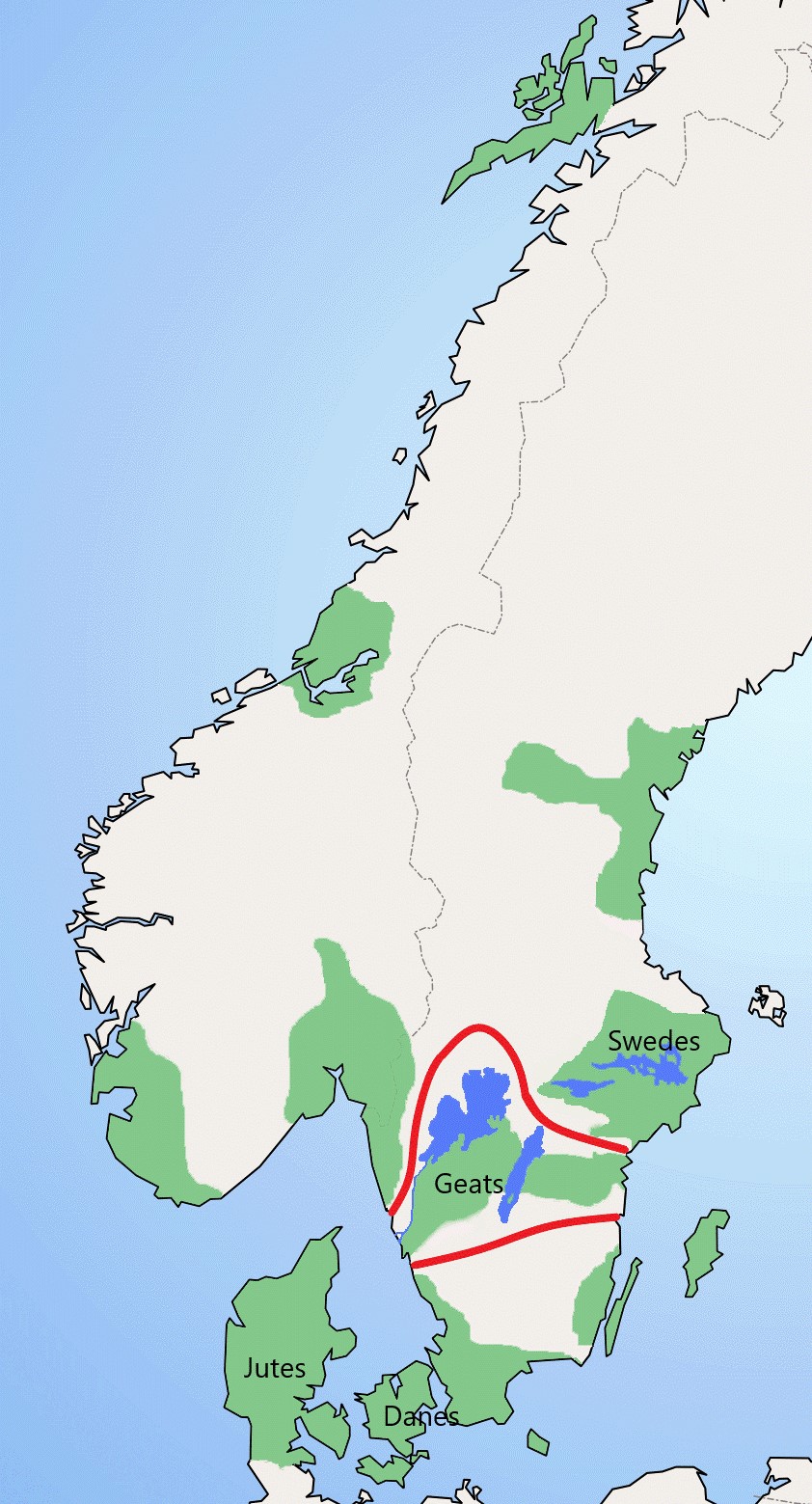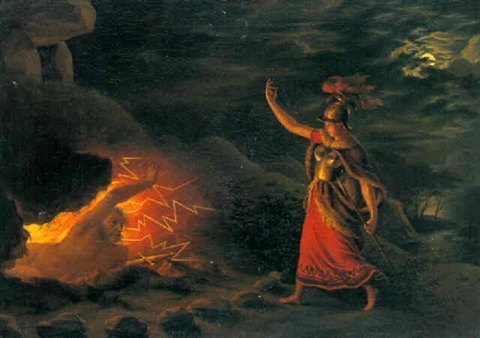|
Sifka
Sifka or ''Sifeca'' is a Hun princess in Norse mythology, the mother of the warrior Hlöd by Heidrek, King of the Geats. She was the daughter of Humli, King of the Huns. After the Geatish Heidrek murdered the Gothic king Harald and his son Halfdan, taking control of the Gothic kingdom, he defeated the Hunnish king Humli. Thereafter, he captured Sifka, Humli's daughter, and raped her. As a result, Sifka became pregnant, was sent back to her father's kingdom, and bore a son whom she named Hlöd. Hlöd was born handsome and valiant. He was raised by his grandfather, the Hun King Humli, and was given weapons and horses as soon as he was born. Upon hearing that Heidrek, his father, was dead, and that his half-brother Angantyr had been proclaimed king of the Goths, Hlöd's grandfather said to him that he had to go to the Gothic kingdom and claim his inheritance. Eventually, a fight ensued, which ultimately led to the death of his sister, Hervor Hervör is the name shared by two fem ... [...More Info...] [...Related Items...] OR: [Wikipedia] [Google] [Baidu] |
Heidrek
Heidrek or Heiðrekr (Old Norse: ) is one of the main characters in the cycle about the magic sword Tyrfing. He appears in the '' Hervarar saga'', and probably also in ''Widsith'',line 115, as ''Heathoric'' together with his sons Angantyr (''Incgentheow'') and Hlöð (''Hlith''), and Hlöð's mother Sifka (''Sifeca''). The etymology is , meaning "honour", and , meaning "ruler, king". Youth Heidrek was the son of king Höfund and his wife Hervor, a shieldmaiden. Like his mother in her youth, he was ill-natured and violent. To amend this, he was raised by the wise Geatish king Gizur, but this did not improve his disposition. One day, when his parents were having a banquet, Heidrek arrived uninvited and late at night, he started a quarrel which ended in manslaughter. His father, King Höfund, banished Heidrek from his kingdom, although Hervor did her utmost to soften Höfund's feelings against his son. His father's advice However, before Heidrek left, his father gave him some words ... [...More Info...] [...Related Items...] OR: [Wikipedia] [Google] [Baidu] |
Hlöd
Hlod or Hlöd was the illegitimate son of Heidrek, the king of the Geats, in Norse mythology. He appears in the '' Hervarar saga'' and probably also as ''Hlith'' in ''Widsith'', line 115, together with his father Heiðrekr (''Heathoric''), half-brother Angantyr (''Incgentheow''), and his mother Sifka (''Sifeca''). Claiming his inheritance Hlöd had grown up with his grandfather Humli, the king of the Huns, and he was both handsome and valiant. As soon as he was born he was given weapons and horses, as was the custom of the time. When Hlöd heard that his father Heidrek was dead and that his half-brother Angantyr had been proclaimed king of the Goths, his grandfather Humli said that Hlod had to go to Arheimar and demand his rightful inheritance. Hlöd arrived to Arheimar with many Hunnish warriors. He found a man outside of the hall and asked him to go inside and tell Angantyr that his brother wished to see him. When King Angantyr learnt of who was waiting outside for him, he ... [...More Info...] [...Related Items...] OR: [Wikipedia] [Google] [Baidu] |
Angantyr
Angantyr was the name of three male characters from the same line in Norse mythology, and who appear in '' Hervarar saga'', ''Gesta Danorum'', and Faroese ballads. The last generation named Angantyr also appears to be mentioned as ''Incgentheow'' in ''Widsith'', line 115, together with his father Heiðrekr (''Heathoric''), half-brother Hlöð (''Hlith'') and Hlöð's mother Sifka (''Sifeca''). Angantyr the Berserker Angantyr's father Arngrim had given him the magic sword Tyrfing, which cut through anything as if through cloth, and which killed a man every time it was unsheathed. He was the tallest of the twelve sons of the berserker Arngrim, and he and his eleven brothers spread fear and destruction through the North. One Yule, they were back home on Bolmsö when the next eldest son Hjörvard, swore that he would win Ingeborg, the daughter of Yngve, the king of Sweden. The twelve brothers departed for Uppsala and Hjorvard proposed to Ingeborg. However then Hjalmar, one ... [...More Info...] [...Related Items...] OR: [Wikipedia] [Google] [Baidu] |
Huns
The Huns were a nomadic people who lived in Central Asia, the Caucasus, and Eastern Europe between the 4th and 6th century AD. According to European tradition, they were first reported living east of the Volga River, in an area that was part of Scythia at the time; the Huns' arrival is associated with the migration westward of an Iranian people, the Alans. By 370 AD, the Huns had arrived on the Volga, and by 430, they had established a vast, if short-lived, dominion in Europe, conquering the Goths and many other Germanic peoples living outside of Roman borders and causing many others to flee into Roman territory. The Huns, especially under their King Attila, made frequent and devastating raids into the Eastern Roman Empire. In 451, they invaded the Western Roman province of Gaul, where they fought a combined army of Romans and Visigoths at the Battle of the Catalaunian Fields, and in 452, they invaded Italy. After the death of Attila in 453, the Huns ceased to be a major thr ... [...More Info...] [...Related Items...] OR: [Wikipedia] [Google] [Baidu] |
Geats
The Geats ( ; ang, gēatas ; non, gautar ; sv, götar ), sometimes called ''Goths'', were a large North Germanic tribe who inhabited ("land of the Geats") in modern southern Sweden from antiquity until the late Middle Ages. They are one of the progenitor groups of modern Swedes, along with Swedes (the tribe) and Gutes. The name of the Geats also lives on in the Swedish provinces of and , the Western and Eastern lands of the Geats, and in many other toponyms. The Swedish dialects spoken in the areas that used to be inhabited by Geats form a distinct group, '' Götamål''. Etymology The etymology of the name ''Geat'' (Old English ', from a Proto-Germanic *''Gautaz'', plural *''Gautōz'') is similar to that of ''Goths'' and ''Gutes'' (*''Gutô'', plural *''Gutaniz''). The names derive from ablaut grades of the Proto-Germanic word *''geutaną'', meaning "to pour". They have the literal meaning "they who pour their seed". (For more information see Goths § Etymology.) The n ... [...More Info...] [...Related Items...] OR: [Wikipedia] [Google] [Baidu] |
Humli
Humli is a legendary king of the Huns who appears in the Hervarar Saga. He is the Grandfather of Hlod, illegitimate son of Heidrek, King of the Goths. Role in the saga After Heideric's death, Humli tells his grandson to go to his father's funeral and demand his heritage. As Hlod arrives at Heideric's funeral he meets his brother Angantyr. Angantyr invites his brother to celebrate with him, but Hlod tells him that he didn't come to fast, but to demand his half of the Kingdom. Agantyr refuses his demand, instead offering him one third of the kingdom and a large number of slaves. He is interrupted by Gizur king of the Geats who says that Hlod does not deserves this as he is the "son of a slave" and a "Bastard". Offended, Hlod returns to his grandfather. Together, they build an army consisting of all horses and men of the steppe and attack the Goths, led by Agantyr's sister, a shieldmaid named Hervor Hervör is the name shared by two female characters in the Tyrfing Cycle, present ... [...More Info...] [...Related Items...] OR: [Wikipedia] [Google] [Baidu] |
Hervor
Hervör is the name shared by two female characters in the Tyrfing Cycle, presented in '' The Saga of Hervör and Heidrek'' with parts found in the ''Poetic Edda''. The first, the viking Hervör, challenged her father Angantýr's ghost in his gravemound for his cursed sword Tyrfing. She had a son, Heidrek, father of the other Hervör. The second Hervör was a commander killed in battle with her brother. The two are thought by some academics to be the same character, duplicated.http://vsnrweb-publications.org.uk/The%20Saga%20Of%20King%20Heidrek%20The%20Wise.pdf Hervör, daughter of Angantyr Childhood Hervör was born after her father Angantyr died during a duel against the Swedish hero Hjalmar. His mother was Svafa, who was daughter of a Jarl Bjarmar. Rather than take on sewing or be raised as a bond-maid like other girls, Hervör proved to be as strong as the boys and learned archery, swordsmanship, and horse riding. She dressed like a man, fought, killed and pillaged under ... [...More Info...] [...Related Items...] OR: [Wikipedia] [Google] [Baidu] |
The Battle Of The Goths And Huns
''The'' () is a grammatical article in English, denoting persons or things that are already or about to be mentioned, under discussion, implied or otherwise presumed familiar to listeners, readers, or speakers. It is the definite article in English. ''The'' is the most frequently used word in the English language; studies and analyses of texts have found it to account for seven percent of all printed English-language words. It is derived from gendered articles in Old English which combined in Middle English and now has a single form used with nouns of any gender. The word can be used with both singular and plural nouns, and with a noun that starts with any letter. This is different from many other languages, which have different forms of the definite article for different genders or numbers. Pronunciation In most dialects, "the" is pronounced as (with the voiced dental fricative followed by a schwa) when followed by a consonant sound, and as (homophone of the archaic pro ... [...More Info...] [...Related Items...] OR: [Wikipedia] [Google] [Baidu] |
People In Norse Mythology
A person ( : people) is a being that has certain capacities or attributes such as reason, morality, consciousness or self-consciousness, and being a part of a culturally established form of social relations such as kinship, ownership of property, or legal responsibility. The defining features of personhood and, consequently, what makes a person count as a person, differ widely among cultures and contexts. In addition to the question of personhood, of what makes a being count as a person to begin with, there are further questions about personal identity and self: both about what makes any particular person that particular person instead of another, and about what makes a person at one time the same person as they were or will be at another time despite any intervening changes. The plural form "people" is often used to refer to an entire nation or ethnic group (as in "a people"), and this was the original meaning of the word; it subsequently acquired its use as a plural form of per ... [...More Info...] [...Related Items...] OR: [Wikipedia] [Google] [Baidu] |



.png)
_1938.jpg)